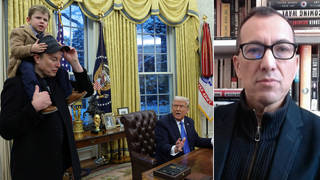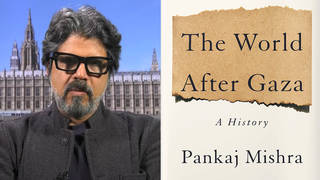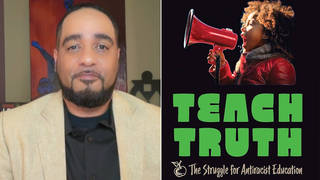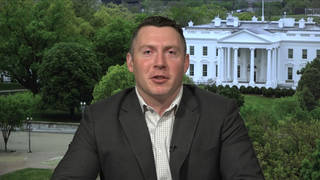
Related
Guests
- Mohammed Abu HashemPalestinian American former U.S. Air Force first sergeant who resigned over the U.S. role in Israel’s war on Gaza.
As Israel’s war on Gaza enters its 10th month, we speak with Mohammed Abu Hashem, a Palestinian American who ended a 22-year career in the U.S. Air Force after an Israeli airstrike in Gaza killed his aunt in October. “It was clear to me that I needed to step away,” says Abu Hashem, who served as a first sergeant in the 316th Civil Engineer Squadron of the U.S. Air Force. He recently co-signed a letter with 11 other former U.S. officials who rsesigned over the Biden administration’s policy toward Gaza, Palestine and Israel. “The American people deserve to have a government that follows ethical and moral standards,” says Abu Hashem, who also talks about briefly meeting Aaron Bushnell before the airman died by self-immolation in February to protest U.S. support for Israel.
Transcript
AMY GOODMAN: This is Democracy Now!, democracynow.org, The War and Peace Report. I’m Amy Goodman.
The official death toll from Israel’s war on Gaza has topped 38,200, but a new report in the British medical journal The Lancet estimates the actual death toll could be 186,000 or even higher. That’s roughly 8% of Gaza’s population. The report looks at how war leads to indirect deaths due to shortages of medical care, food, shelter and water.
As Israel’s war enters its 10th month, we’re joined by a Palestinian American who ended a 22-year career in the U.S. Air Force after an Israeli airstrike in Gaza killed his aunt, Saida Saleh Abu Hashem. Mohammed Abu Hashem served as a first sergeant in the 316th Civil Engineer Squadron of the U.S. Air Force. He’s the first to resign with a direct connection to Gaza’s massive civilian death toll. He recently co-signed a letter with 11 other former U.S. officials who resigned over the Biden administration’s policies toward Gaza, Palestine and Israel. The officials wrote in the letter, quote, “[T]his failed policy has not achieved its stated objectives — it has not made Israelis any safer, it has emboldened extremists while it has been devastating for the Palestinian people, ensuring a vicious cycle of poverty and hopelessness,” unquote. Mohammed Abu Hashem joins us now from Akron, Ohio.
Mohammed, thanks so much for being with us. Condolences on the death of your aunt. Can you talk about why you resigned and when you did it?
MOHAMMED ABU HASHEM: Thank you, Amy. And thank you for the opportunity.
I served 22 years in the Air Force. I hoped, as a Palestinian American, I could lead with my voice one day, because we know that representation matters. I never expected it to be at a time where we’ve seen the indiscriminate killing of — well, now new reports, as you stated, approximately 186,000 Palestinians, including my family members.
It was clear to me that I needed to step away, and I made my decision on October 21st, after trying my best to give evidence to the intelligence community. And when I never received anything back, I knew then, and along with watching other members of the State Department resign — I knew that no matter how high in the rank I would have reached, no one was going to listen in a time this administration was not going to change their mind.
AMY GOODMAN: Why did you join the military?
MOHAMMED ABU HASHEM: I joined the military in early 2002, in January of 2002, right after 9/11, really, because I felt a need and necessity as an 18-year-old when I watched the attack of 9/11. I was worried and concerned about the family that I have here, just like most people were concerned about what further escalation this was going to cause. And I was concerned for not only my family, but some of my friends and their family members that I consider family [inaudible] over here in America.
AMY GOODMAN: Can you talk about your aunt and what happened to her in Gaza?
MOHAMMED ABU HASHEM: Absolutely. And I brought this evidence of what happened to one of my direct leads that has oversight on the personnel in the Defense Intelligence Agency.
The building, the apartment complex that they lived in, is a four-resident complex. And the majority of the people that lived there are shop owners, teachers, just regular, every single day people. Every single person that made it out told me directly that there was nobody out of the ordinary in the building. Yet the Israeli military claimed that it was a Hamas operational structure.
I rebutted that response and asked again, “How was it a Hamas operational structure?” At the very least, why they waited until all the residents to reenter the building before striking the residence? Because they did perform a roof knock that even my cousin told me about. And the majority of the residents of that building, to include the 12 children that was killed on that day, exited the building for approximately 90 minutes. My uncle informed me directly that as soon as they made it into the building and into their living room, they found themselves underneath the rubble.
AMY GOODMAN: And tell us exactly what you understand happened to your aunt, in particular, and who she was.
MOHAMMED ABU HASHEM: My aunt was just a housewife. She didn’t work. My uncle was the one that provided for the family. She has three kids. She was just a regular, everyday, household, you know, family member.
She was struck in the living room. And some of the residents were telling me that they could still hear her voice when they were pulling people under the rubble. And we were informed that there was a possibility that she was still alive while under the rubble, but they couldn’t get to her in time.
AMY GOODMAN: And so, that happened in October. Can you talk, then, about resigning but then not making that public until recently, months later? What led you to that decision, Mohammed?
MOHAMMED ABU HASHEM: In the beginning, I was going through my own struggles, not only just as an American member watching what’s happening and what’s unfolding, but as a Palestinian that has direct ties. And I tried to reach out to members of the media, but no one in the beginning was — the totality of what was happening was not as vast as what it is today, and I was not receiving the same kind of response. It wasn’t until I started reaching out to the other State Department resignations and making those connections with people that I finally started to get my story to the right people. And it wasn’t until June, when I was officially completely out of the military, that I was able to get my story out on The Washington Post.
AMY GOODMAN: Mohammed Abu Hashem, you made it to the rank of sergeant. You met another airman. Can you talk about meeting Aaron Bushnell and then what he would subsequently do, and when and where you met him?
MOHAMMED ABU HASHEM: Absolutely. It was crazy to me how our meeting was and the fact that I decided to move away from Washington, D.C., after everything that happened. I moved to Akron, Ohio, in February, and I took a position in a company that does home improvement. And within the first week of working in this company, I ran into — I was introduced to Aaron as another veteran who was currently ready to leave the service. And we just had a brief conversation, a 30-second conversation, how he enjoyed what his experience was like in the company. And it wasn’t until four days later, five days later, when I came back into work, that I realized, on the news articles, that that was the same individual that I was talking to.
And it really took me back. It took me a week to analyze and really think about the possibility that I could have had in the conversation with Aaron to let him know why I decided to leave the service, and me being Palestinian, what that conversation could have been like. My entire job as a first sergeant in the military was to take care of the welfare and the morale of the individuals that I served over. And it was just — it dawned on me then that I probably could have done more, if we went into a deeper conversation, for Aaron Bushnell. But, unfortunately, that’s when I heard about it, the very — the following weekend, or on Monday, when I came back into work, what happened.
AMY GOODMAN: And talk about how you heard, what you understood he did.
MOHAMMED ABU HASHEM: Initially, I saw the reports online, and I did not make the connection immediately, because when I was introduced to him, we never really introduced each other by name. We just — veteran to veteran, we just had a conversation. It wasn’t until the company announced that we lost a member that I started to make that connection. And it wasn’t until some of the people that I worked with came up to me and told me, that that’s when I realized who Aaron Bushnell was.
AMY GOODMAN: That the man who self-immolated, set himself on fire, was Aaron. Mohammed Abu Hashem, you have said that you have information that U.S. intelligence gave Israel information about what was going to happen, what happened on October 7th, before then. Can you talk about what you understand?
MOHAMMED ABU HASHEM: So, I spoke to members in the intelligence community that told me — this is I’m just quoting — that the intelligence that was provided to Israel on the 5th and 6th of October was more than sufficient for them to be able to stop Hamas. Regarding what kind of information was provided, whether it was confirmation of the movements that was happening around the Gaza Strip, or even if you refer to some of the Israel news articles, even their outposts near Gaza, they were informing their leadership that some type of movement was happening, and it was inconsistent with normal, everyday activity. What and how Israel used that intelligence to up their force protection levels or to move to an alert status, that is the unknown. And unfortunately, they’ve delayed that investigation into the matter so they can continue their assault on innocent women and children.
AMY GOODMAN: Now, it might surprise some to hear that the U.S. gave actionable intelligence to Israel before Hamas’s October 7th attack. So, if you could elaborate, as people listen, maybe some of them stunned?
MOHAMMED ABU HASHEM: We continuously — I mean, the Gaza Strip is one of the most heavily surveilled locations in the globe. And this is not just surveillance. We continue to do reconnaissance in the region, as well. So, it’s not far from realistic to say that we had evidence or that it was provided to the Israeli government or that the Israeli government shared intelligence with the United States that shows that there was some sort of threat level that should have been alerting all the military forces in the area of some type of imminent attack that was going to happen.
AMY GOODMAN: Finally, Mohammed, as you have become publicly known as a person who resigned, a first person with a direct connection to Israel’s assault on Gaza right now, have people approached you? And talk about this letter you signed with 11 others, officials, talking about their reasons for resigning connected to U.S. support for Israel.
MOHAMMED ABU HASHEM: Even before I signed the letter myself, I’ve had people reach out to me, asking me how they would deal with how they should move forward with the situation. And I always — it’s a saying in the military where we say you follow all orders unless they are illegal, unethical or immoral. I found that all three were violated, in my morals and my ethics, and, obviously, the legal aspect would be the American laws that were violated, as well. And every time I spoke to these members, I told them it’s up to them to find whether this violates their own morality and their own ethics, and it’s up to them to make that decision for themselves.
We understood — as the 12 members, we understood the power of raising our voices together to demand a change, because the American people deserve to have a government that follows ethical and moral standards. We have a duty to inform them, as it impacts their national security with the blind support we continue to provide for Israel. There aren’t many conflicts where everything is broadcasted live to the world. It’s on every social media platform. So we needed to step up to demand a change. And I hope that it would raise awareness with all our colleagues to use their voice if they stay in the State Department or to make a choice on whether they believe that this follows their own ethics or their own morals, in order for them to make a decision whether they want to stay or resign over this conflict.
AMY GOODMAN: Mohammed Abu Hashem, I want to thank you for being with us, former first sergeant in the U.S. Air Force. He resigned from his 22-year career in the Air Force over U.S.'s support for Israel in its war on Gaza. Mohammed is Palestinian American. His aunt was killed in Gaza by an Israeli airstrike on October 10th. He's the first to resign with a direct connection to Gaza’s massive civilian death toll.
When we come back, we’ll speak with investigative journalist Jeremy Scahill. He has a new report out, based on interviews with senior Hamas officials, about ongoing ceasefire negotiations and the group’s broader goals. He co-founded The Intercept. Now he’s co-founded a new news site. It’s called Drop Site. Stay with us.












Media Options